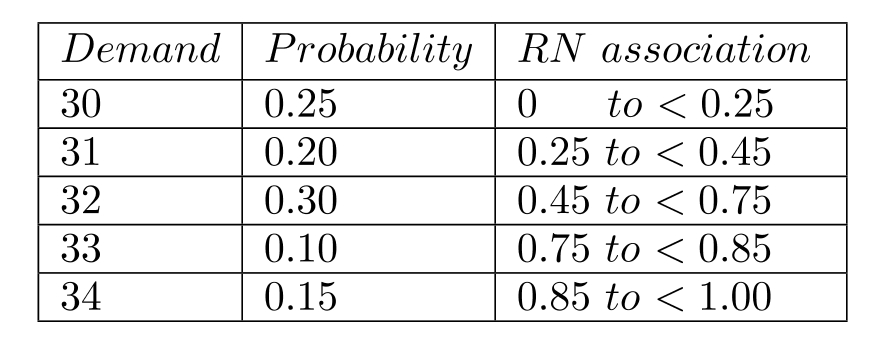Exam 14: Simulation Cdrom Modules
Exam 1: Introduction to Management Science, Modeling, and Excel Spreadsheets33 Questions
Exam 2: Forecasting75 Questions
Exam 3: Linear Programming: Basic Concepts and Graphical Solutions59 Questions
Exam 4: Linear Programming: Applications and Solutions61 Questions
Exam 5: Linear Programming: Sensitivity Analysis, Duality, and Specialized Models55 Questions
Exam 6: Transportation, Assignment, and Transshipment Problems53 Questions
Exam 7: Integer Programming58 Questions
Exam 8: Network Optimization Models61 Questions
Exam 9: Nonlinear Optimization Models60 Questions
Exam 10: Multi-Criteria Models60 Questions
Exam 11: Decision Theory59 Questions
Exam 12: Markov Analysis52 Questions
Exam 13: Waiting Line Models50 Questions
Exam 14: Simulation Cdrom Modules47 Questions
Select questions type
Using a standard approach to simulating random variables which follow Uniform Distribution UN [20,30] , what would be the simulated value if 30 is the two-digit random number picked from the random number table?
Free
(Multiple Choice)
4.9/5  (33)
(33)
Correct Answer:
A
Simulating a discrete distribution with two events- with probability 0.35 and with probability 0.65 - using two-digit random numbers is usually done by associating a random number from 00 to 34 with and 35 to 99 with . A new analyst wants to associate 00 to 09 and 75 to 99 with and the remaining random numbers with . Which of the following is true?
Free
(Multiple Choice)
4.9/5  (31)
(31)
Correct Answer:
C
In theory, the numbers on a random number table follow these properties: all numbers are equally likely, and if you take the numbers in a row only (left to right or right to left, but not top to bottom or across), no pattern appears in the sequence of numbers.
Free
(True/False)
5.0/5  (33)
(33)
Correct Answer:
False
For simple waiting line systems, simulation makes it easier to find the operating characteristics than waiting line theory.
(True/False)
4.9/5  (31)
(31)
Time between failures of a critical machine follow normal distribution, with a mean of 30 hours and standard deviation of 5 hours. If the random normal deviate chosen from a table of normally distributed random numbers is 2.5 , the number of simulated hours before the next failure will be:
(Multiple Choice)
4.8/5  (39)
(39)
Probabilistic simulation is akin to sampling, each run representing one sample.
(True/False)
4.8/5  (40)
(40)
In simulation several alternatives are evaluated, and one chooses the best among the alternatives evaluated.
(True/False)
4.9/5  (32)
(32)
In a normally distributed random number table, about half the numbers will be negative.
(True/False)
4.8/5  (33)
(33)
Daily demand for a product is described in the table below. Profit per unit sold is . Unmet demand costs are in goodwill. The demand is not carried forward. Excess stock is liquidated on a daily basis at a cost of per unit. That is, excess stock is not carried forward in stock. Orders have to be placed using a fixed policy of ordering number of units each day. Lead-time is 0 , but only one order can be placed each day. What should be the value of in order to maximize profit? Try two "good" ordering policies (i.e. two order quantities), simulate the profit corresponding to the two policies for 10 days, and choose the best quantity.

(Essay)
4.9/5  (35)
(35)
Most practical applications of simulation can be solved using a paper and pencil approach.
(True/False)
4.8/5  (24)
(24)
The purpose of validation is to make sure that the computer program does what was intended to be done.
(True/False)
4.9/5  (33)
(33)
All deterministic simulations incorporate mechanisms for mimicking a random behavior of one or more variables.
(True/False)
4.7/5  (38)
(38)
Using excel, once we create a set of random numbers with the formula Rand(), then the numbers will remain the same even if we refresh the sheet.
(True/False)
4.9/5  (30)
(30)
Using the equation large random numbers produce small time values.
(True/False)
4.9/5  (28)
(28)
There is a backyard lake in your house with a very odd-shaped boundary. You drew a computer map of it, enclosed it in a rectangle, and used simulation to estimate its surface area. You must have used
(Multiple Choice)
5.0/5  (44)
(44)
If you are interested in predicting the time of day a road block may occur, you would use
(Multiple Choice)
4.8/5  (35)
(35)
In a normally distributed random number table, about of the numbers will be between -1 and +1 .
(True/False)
4.7/5  (33)
(33)
Showing 1 - 20 of 47
Filters
- Essay(0)
- Multiple Choice(0)
- Short Answer(0)
- True False(0)
- Matching(0)